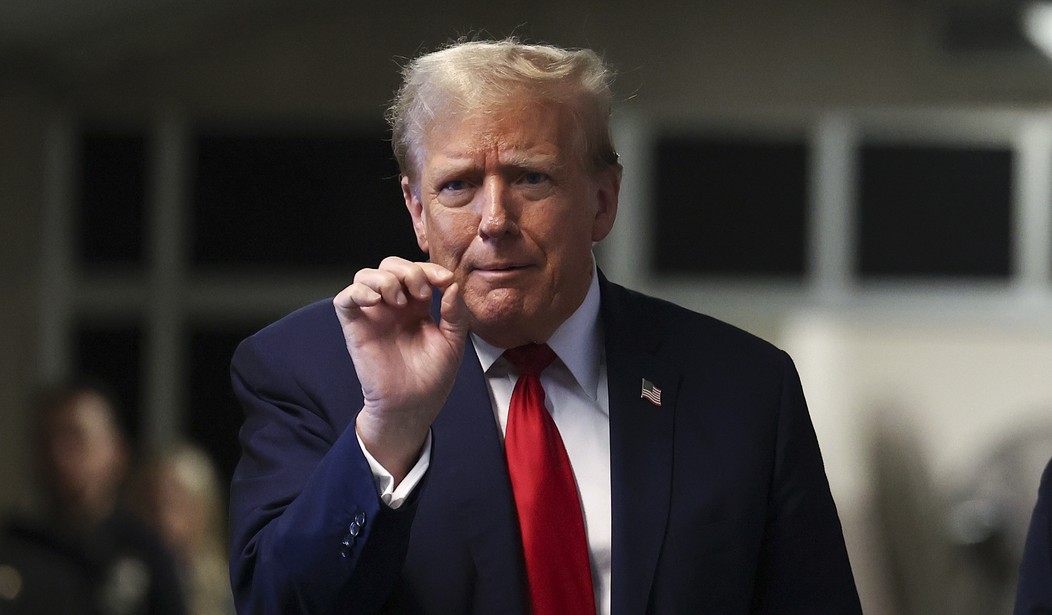In general, it's wise to guard against over-interpreting or over-extrapolating results from primary, special, and other lower-turnout elections. There can be notable lessons or trends, of course, and watching what actual voters are doing is always significant on some level. But drawing dramatic conclusions from such outcomes can be a fool's errand. With that caveat in place, let's talk about Pennsylvania's primary election this week. With both major party's top-of-the-ticket races effectively resolved, less-than-stellar turnout wasn't surprising. And those who participated in spite of the lack of drama may have painted a skewed picture of overall voter sentiment in the state. Arguably, there was more incentive to turn out on the left end of the spectrum because a substantial subset of that electorate wants to send a disturbing message to President Biden over Hamas and Gaza.
With that in mind, some enthusiasm and unity red flags emerged from the data on the GOP side. More people voted in the Democratic presidential primary (~988,000) than the Republican presidential primary (~942,000) statewide, and Biden won a significantly higher share of his party's official vote total (93 percent) than Donald Trump did (83 percent). For reference, these totals are way down from the contested primary cycle of 2016, when nearly 1.6 million Republicans voted, alongside nearly an identical number of Democrats. Trump went on to carry the state that year, by a very slim margin. In the other statewide primary this week, the gap between teams red and blue was even more stark: More than one million Democrats cast ballots in the Attorney General contest, compared to just 873,000 doing so in the GOP race. What explains the dynamic of so many more Democratic voters voting in the down ballot race than the one at the top of the ticket? One major factor was presumably the "uncommitted' write-in campaign from the Hamas-sympathizing wing of the party. Those votes didn't show up in the official presidential primary totals, as reported by the New York Times, but the resulting gap gives us a clue that thousands of these primary voters submitted written-in protest votes against Biden, then voted as usual on the AG line. That points to an ongoing concern among Democrats ahead of the general election.
But even without the tens of thousands of tallies against him (entailing Dean Phillips and write-in votes), Biden won a lot more primary votes than Trump did. The incumbent snagged nearly 925,000 votes on Tuesday, while Trump lagged behind, around 790,000. Part of the reason for this was a very substantial number of GOP voters who turned out and voted for Nikki Haley, even though she dropped out of the race weeks ago. As others have noted, this was a closed primary, so only registered Republicans could take part. The more than 150,000 ballots cast for Haley can't be blamed on Democrats or left-leaning independents meddling in the GOP process. These were bona fide Republican voters, disproportionately concentrated in key suburban areas where the party has under-performed since 2016, going out of their way to vote against the presumptive nominee:
Recommended
In a closed GOP primary in a key swing state, 155,000+ Republicans went out of their way to vote for Nikki Haley pic.twitter.com/tt667LDe2R
— Jamie Dupree (@jamiedupree) April 24, 2024
And nobody can reasonably claim most of these are actually Democrats who are trying to hurt Trump in the primary. These are real GOP voters who must be courted not mocked. https://t.co/IDNd45NOUl
— David Marcus (@BlueBoxDave) April 24, 2024
When Haley exited the race in early March, she said: "It is now up to Donald Trump to earn the votes of those in our party and beyond it who did not support him. And I hope he does that. At its best, politics is about bringing people into your cause, not turning them away. And our conservative cause badly needs more people." This sentiment was derided and dismissed by many Trump fans, but whether they like it or not, she was right. Unity and support aren't an entitlement; they must be earned. One factor that might help woo some of the 155,000 or so Haley voters (whether as fans of hers, or using her as a stand-in to register dissatisfaction with Trump) in this critical swing state is Trump's selection of a running mate. He's commented that this decision doesn't matter much, but it matters more than usual this cycle, and I think he knows that. Both ticket mates matter more than usual because each presumptive nominee is historically old.
Beyond that, Trump's pick will be the only new face in what is otherwise expected to be a very familiar 2020 rematch. This represents an opportunity to reassure the sorts of voters who are inclined against rewarding Biden with another term, especially with Kamala Harris waiting in the wings, but who also remain uncomfortable with Trump for various reasons. This decision holds real weight. We'll see how he chooses soon enough. And for all the chatter about Biden's issues on his left flank, and those are real, Keystone State Republicans flashed a now-familiar warning sign at the Trump campaign on Tuesday. It's not just some one-off phenomenon on a single, albeit important, battleground. We've been seeing a lot of this:
Percentages voting against Trump in closed (i.e. GOP-only) primaries/caucuses:
— Aaron Blake (@AaronBlake) April 24, 2024
3/2 Idaho 15%
3/5 Okla. 18%
3/5 Tennessee 19.5%
3/5 Utah 44%
(Haley drops out)
3/19 Florida 19%
3/19 Kansas 24.5%
4/2 Conn. 22%
4/2 N.Y. 18%
4/23 Pennsylvania 16.5%
In the ballpark of one-in-five Republican voters -- those who make the effort to show up and cast ballots, knowing that the eventual outcome is a fait accompli -- are sending clear signals that they are not enamored with the man their party is about to nominate for the third time. I'd guess that many of them will plug their noses and vote for the ticket anyway in November. Some may be determined to vote for other options in the general, including a number for Biden. Others, however, are wavering. They are winnable. Insulting them as irrelevant dinosaur RINOs strikes me as a bad idea.
Parting thought: The Pennsylvania results align with data I've been fixated on lately, showing that Democrats are now the high-propensity-turnout party, whereas Republicans will need to lean on less reliable voters (and maybe some currently unregistered voters) to win in a high-attention general election. Tuesday's outcomes further underscore how Democrats frequently do indeed enjoy an advantage among the most motivated and committed voters. That's no small thing. The Trump campaign and GOP have serious, resource-heavy work ahead of them in terms of identifying the 'sometimes,' 'rarely,' and 'never before' voters who polls show favor Trump by large margins -- and getting them registered, getting ballots into their hands, or getting them into voting booths. That's not an easy lift, but it could well be the difference between winning and losing. I'll leave you with a new round of swing state polling that looks good for Trump, including in PA. Will these people all find a way to actually vote, though? The Democrats will:
Recent momentum for Biden has faded in swing states, according to new poll by @Bloomberg and @MorningConsult. Trump leads in NC (+10), Nev. (+8), Ariz. (+7), Ga. (+6), Wisc. (+4) and Pa. (+1). Biden edges Trump in only one swing state, Mich. (+2). https://t.co/0rPRM4k2TT
— Peter Baker (@peterbakernyt) April 24, 2024

























Join the conversation as a VIP Member